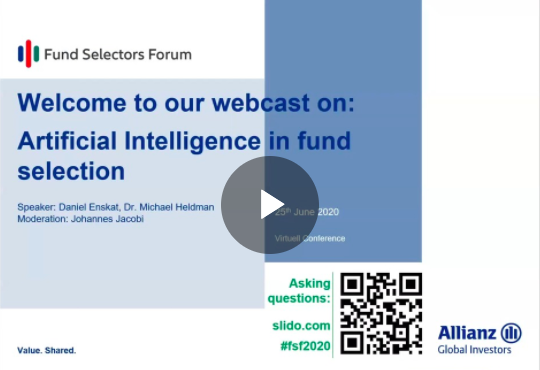AI shouldn’t be regarded as a threat by the asset management industry but firms need to urgently start engaging with this technology, says Daniel Enskat, Head of AI research and analytics at the Warren Enskat Group.
Enskat, who is also Co-Founder at the M&A consultancy, said asset managers need to instead understand how AI can be of practical help to their business in order to remain competitive.
“You can start small or big but you need to start now”, explained Enskat. “The issue is not between the human and the person, it’s the idea how do you better connect the two?"
“There are jobs that are very repetitive and these will go. For example, just look at the Amazon warehouses now run by robots. But if we look at the service-oriented jobs that are based on relationships, they won’t go but will instead be enhanced by these [AI] tools.”
Enskat, who is also Co-Founder at the M&A consultancy, said asset managers need to instead understand how AI can be of practical help to their business in order to remain competitive.
“You can start small or big but you need to start now”, explained Enskat. “The issue is not between the human and the person, it’s the idea how do you better connect the two?"
“There are jobs that are very repetitive and these will go. For example, just look at the Amazon warehouses now run by robots. But if we look at the service-oriented jobs that are based on relationships, they won’t go but will instead be enhanced by these [AI] tools.”
Enskat, who has received huge amounts of funding to research AI and how it is currently being used by the likes of JP Morgan and Morgan Stanley, is excited about its potential but warns firms need to be realistic with their assumptions of its potential.
“Ninety percent of industry leaders want to do something with AI but only 50% know enough to make sound decisions,” said Enskat.
“They need to understand what level the technology is at. We have 60 years of what can be considered AI to look at, right now in some areas we have machines with near superhuman abilities but in terms of general intelligence we are not even close to that of a rat.”
Identifying areas such as passive product creation, data analysis and administrative tasks as potential beneficiaries of AI, Enskat warns that if asset managers don’t innovate then other firms will.
“AI won’t take over the investment management industry but powerful companies like Google and Amazon might come to look at finance with a powerful distribution and trust component that could attract clients,” said Enskat, citing the success of Alibaba in China and the popularity of its money market funds. “In general, [AI] will be more of an enhancement than a threat.”
Dr Michael Heldmann, CIO of Systemic Equity US at Allianz Global Investors, is in agreement and says the asset management industry needs to move past its misconceptions of AI.
“It’s important to understand AI, its advantages and limitations, without getting lost in the hype,” said Dr Heldmann. “For us it’s about incorporating AI on a broader basis into our investment products and we think – if we use it correctly – it could really be an important driver for performance.”
To this end, Dr Heldmann says he is excited about the potential of AI to improve portfolio construction and sit along human investment teams. Specifically, he says this kind of technology can be used to efficiently analyse huge masses of data for the benefit of portfolio managers.
“The better use of AI is working with it as an essential system so all the data is digestible and turned into actionable insights that result in the final portfolio,” said Dr Heldmann.
“The advantage is the AI system only needs to learn about specific things, where the data is sufficient, and not about how the whole world works.”


